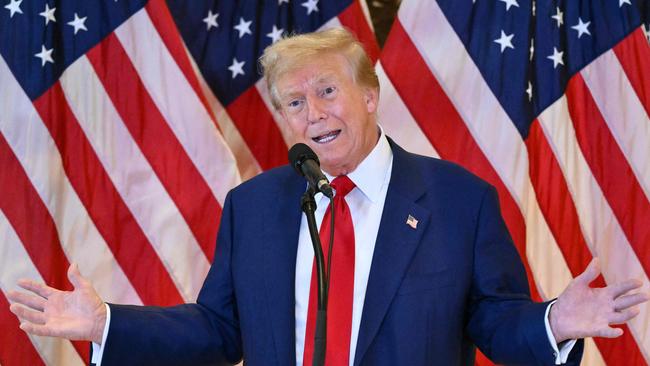How the Trump case risks corroding the ‘very definition of the republic’
Half the US is cheering the former president’s verdict, but the hush money trial highlighted glaring weaknesses in the American justice system.

Of all the pillars of American democracy, the rule of law is the most fundamental. The first conviction of a former president is now testing this bedrock of the 247-year-old republic like never before. Will it hold?
Half the country is cheering the comeuppance of Donald Trump while the other half believes he is a victim of “lawfare” - the weaponisation of the legal system by his opponents. Trump put one democratic pillar - the electoral system - through its most extreme stress test after the 2020 election when he refused to accept defeat. His false claims were rejected.
Now that Trump has lost in court, to a case brought by an elected Democratic district attorney on a configuration of charges never used before that increased their severity, the resilience of the legal pillar will be subject to similarly intense challenge.
John Adams, the second US president, wrote in his influential 1776 pamphlet Thoughts on Government that “the very definition of a republic is an empire of laws, and not of men”.
The Founding Fathers always feared that populism and demagoguery would challenge their democratic structures and sought to embed checks and balances. However, no perfect system of government has been invented and a certain amount of goodwill was always required for the republic to function politically.
Trump does not come from this tradition. It is hard to imagine him conceding, as Al Gore did in 2000 after the Supreme Court gave Florida to George W Bush in a split decision along ideological lines. Trump has never conceded the 2020 election.
The danger of putting a former president on trial was foreseen by Gerald Ford when he risked his political capital by pardoning Richard Nixon, ending the possibility of a court case after his resignation in 1974.
Ford is viewed favourably by historians for sparing America the ordeal of a trial. No such intervention was even considered by President Biden. Only one prominent Republican had the temerity to call for Americans to accept the jury’s verdict on Trump. “Regardless of the result, I urge all Americans to respect the verdict and the legal process,” tweeted Larry Hogan, the moderate former governor of Maryland, who is running to become a senator. “At this dangerously divided moment all leaders, regardless of party, must not pour fuel on the fire with more toxic partisanship. We must reaffirm what has made this nation great: the rule of law.”
The response was enormous. Chris LaCivita, one of Trump’s campaign managers, posted: “You just ended your campaign.” Even other moderate Republicans reacted angrily. Susan Collins, a Republican senator from Maine who voted for Trump’s conviction in his second impeachment trial, posted: “The district attorney, who campaigned on a promise to prosecute Donald Trump, brought these charges precisely because of who the defendant was rather than because of any specified criminal conduct.”
This highlighted a glaring weakness of the US democratic system: Alvin Bragg, the Manhattan district-attorney, campaigned for office on holding Trump “accountable by following the facts where they go”. The New York state attorney-general, Letitia James, campaigned for her job by calling Trump an “illegitimate president” and brought the civil fraud case that ended with $US355m fine for Trump. Unlike in the criminal case, where the facts were decided by a jury, James’s case was overseen by just the judge, also an elected Democrat.
These political affiliations bring the system into disrepute and undermine all appeals to respect the rule of law, especially in such divisive times. The notion that legal rulings must be followed was already undermined by Trump’s pledge to pardon all those convicted for invading the US Capitol. Republicans view with equal horror the impunity for shoplifters in Democrat-run cities that are driving shops to close.
John Adams warned about this in another quote, from 1815. “Remember, democracy never lasts long. It soon wastes, exhausts and murders itself. There never was a democracy yet that did not commit suicide,” he said.
The US political system is cracking under deep partisan divisions. If the rule of law continues to corrode there will be no mechanisms left for Americans to settle their differences peaceably.
The Times






To join the conversation, please log in. Don't have an account? Register
Join the conversation, you are commenting as Logout